
There is significant interest in contemporary scientific society in the search for new forms of therapeutic and preventive agents with regenerative and antioxidant properties. The use of peptide complexes in clinical practice is gaining momentum as more and more literature reports beneficial effects on the body [1,2].
The peptide IPH REG possesses regenerative, antioxidant, and reparative effects, which are attributed to its ability to repair DNA damage. IPH REG peptides can regulate cellular activity by interacting with specific receptors. They activate certain genes involved in extracellular matrix renewal and cell proliferation, which accounts for their high cell and tissue regeneration capacity [2,3].
The ability to repair DNA damage contributes to the effective stimulation of regeneration in living organisms [3].
By employing the antioxidant concept as a basis in the proposed mechanisms to prevent so-called free radical reactions, medicine is in search of agents capable of meeting the requirements of a strong antioxidant and immunomodulator. It is worth noting that it has been reliably proven that free radicals damage all biochemical components of the cell, such as DNA/RNA, carbohydrates, unsaturated lipids, proteins, and trace elements, such as carotenoids (alpha- and beta-carotene, lycopene), vitamins A, B6, B12, and folic acid. Protection strategies against such aggressive types of radicals include the use of enzymes, natural antioxidants that are naturally present in the body (glutathione, uric acid, coenzyme Q10, and others), as well as radical-scavenging nutrients such as vitamins A, C, and E and carotenoids [4,5].
The use of drugs capable of regulating the apoptosis system and thereby preventing the development of both pathological and malignant growth is considered new in clinical practice. Peptide complexes, in particular, the immune peptide IPH REG, possess this ability, as has been repeatedly demonstrated in published studies [4-8].
This article provides a brief overview of the research results on the effects of applying IPH REG, which may contribute to optimizing antioxidant, reparative, and immune statuses and, therefore, provide additional preventive benefits for overall health. Increasing levels of local and systemic biomarkers released during peptide application and possessing protective properties indicate that their use is important for the preservation and restoration of organ functions at any stage of life and in any disease.
Objective: To study the possibilities of the peptide complex IPH REG as a regenerator and immunomodulator.
We investigated the effects of IPH REG as a regenerator and immunomodulator on cell, tissue of rats, and patients.
To evaluate the antioxidant, regenerative, and reparative properties of the peptide IPH REG, we assessed its molecular activity on samples of hematopoietic stem and progenitor cells (HSPCs). We studied the expression of molecules before the start of the study, upon addition of the nutrient medium – incubation with serum albumin (control), upon addition of the control peptide dipeptide Glu-Trp at a concentration of 100 micrograms (μg), and upon addition of the peptide IPH REG at a concentration of 100 micrograms (μg). PCR method was applied. The examination of preparations was performed using an Olympus FluoView FV1000 confocal microscope. The dynamics of gene expression were measured in arbitrary units, with the baseline level set at 10.
Subsequently, we studied 40 rats aged 16.6±1.2 months and weighing 398.3±2.3 g, which were subjected to mechanical damage to the skin. The rats were divided into 2 groups – control (n=20) and experimental (n=20). Rats in the experimental group were orally administered IPH REG. Subsequently, the rats were euthanized, and the expression of molecules in preparations of damaged skin was investigated.
The next stage of this study was to examine the oxidative status in somatically healthy patients (n=56 individuals, mean age 45.6±1.2 years). The peptide IPH REG was orally administered according to the following schedule: 1 capsule (100 μg peptide) once a day for 30 days, followed by a 30-day break – and a repetition of a similar course for another 30 days, followed by another 30-day break – and a third course for 30 days. The total course comprised 6 months (with 3 courses of 30 days each and 3 breaks of 30 days each).
German peptides IPH REG have all approvals and authorizations for global markets, such as: WADA certificate (anti-doping), MAFFA safety certificate, ORGANIC certificate, HALAL certificate, patent protection: patent in the United States № 5,405,266, patent in the European Union № 016704471, patent in the Russian Federation № 645608, patent in the People’s Republic of China № 30507522.
The effectiveness of IPH REG peptide application was evaluated by us before the start of the study, at 3 months, and at 6 months. The determination of the activity of the prooxidant and antioxidant systems was carried out on a Hitachi U-29 spectrophotometer (Japan). The catalase number in the blood was considered normal within the range of 11 to 20 units, the level of superoxide dismutase content was considered normal within the range of 1190 to 1990 U/g Hb, and the reference values for xanthine oxidoreductase were accepted within the range of 4.52–5.97 U/ml.
During data processing, the average intensive and extensive values were calculated with the calculation of the mean error; the significance of differences between two populations was assessed using the Student’s t-test (the difference was considered significant at t>2, p<0.05). Correlation analysis was performed.
Components of the immune system involved in the inflammatory response can serve as markers defining disease development and prognosis and may also be potential therapeutic targets. These components include cytokines IL-33, sST2, and the IL-33/ST2 receptor complex, which actively participate in modulating the inflammatory response.
The marker IL-33 regulates the immune response to environmental stressors and tissue damage, thereby controlling tissue damage and the development of infectious responses. Accordingly, increased expression of this molecule stimulates the immune system to manage tissue damage and the development of infectious responses.
We examined the activity of the IL-33 molecule in cells, as presented in Figure 1, and demonstrated that the application of the peptide regenerator and immunoregulator IPH REG leads to enhanced synthesis of IL-33, which controls tissue damage processes and the development of excessive inflammation. Thus, it can be concluded that the IPH REG peptide possesses reparative, regenerative, and anti-inflammatory properties.
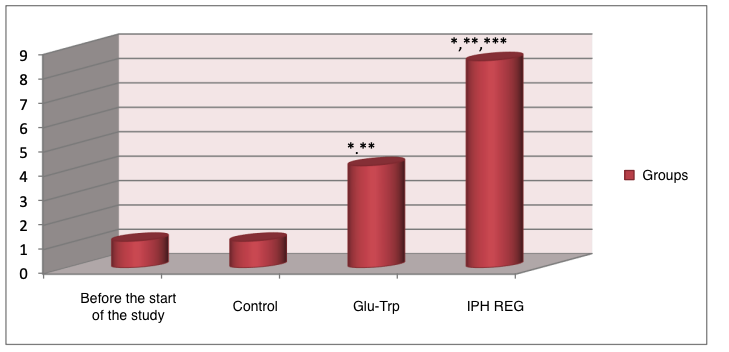
*p<0.05 compared to baseline data;
**p<0.05 compared to control;
***p<0.05 between expression levels when applying Glu-Trp and IPH REG.
Figure 1. Influence of the IPH REG peptide on the expression of IL-33 in human cell culture
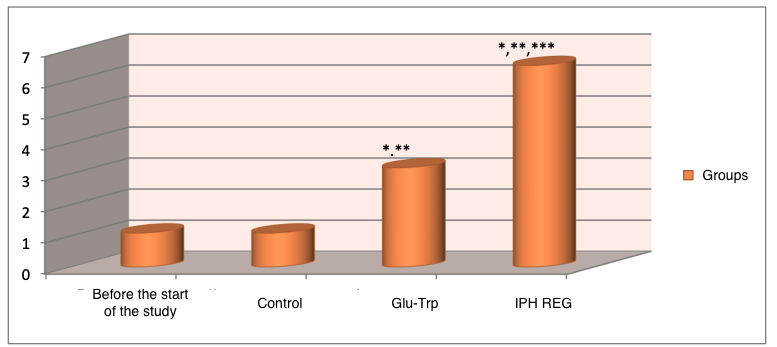
*p<0.05 compared to baseline data; **p<0.05 compared to control; ***p<0.05 between expression levels when applying Glu-Trp and IPH REG.
Figure 2. Influence of the IPH REG peptide on the expression of NKT cells in human cell culture
From a clinical perspective, it was important to study the expression of NKT cells, which serve as key regulators of the immune response, contributing to the protection of the body against tumor development, growth, and metastasis, intracellular infections of various kinds, as well as the development of autoimmune diseases. According to Figure 2, when the IPH REG peptide was applied, an increase in NKT cell expression was observed in 48.5±1.1%, indicating that the IPH REG peptide is a potent immune regulator with anti-inflammatory properties.
Similar activity was observed regarding IFN-γ (gamma interferon), indicating the high antioxidant ability of the studied peptide (Figure 3).
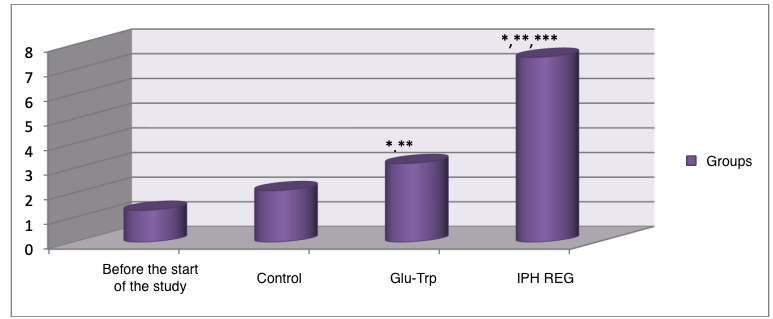
*p<0.05 compared to baseline data;
**p<0.05 compared to control;
***p<0.05 between expression levels when applying Glu-Trp and IPH REG.
Figure 3. Influence of the IPH REG peptide on the expression of IFN-γ in human cell culture
During the experimental study, the examination of skin preparations of rats showed the following. The CXCL10 molecule – interferon-gamma-induced protein 10 (IP10) has properties stimulating the adhesion of T-cells to endothelial cells, anti-tumor activity, and promotes angiogenesis. Morphometric analysis of the percentage of proliferating keratinocytes showed that after the application of the IPH REG peptide, CXCL10 expression was significantly higher by 34.2±1.1% than in the control group (Figure 4).
These results indicate that one month after the application of the IPH REG peptide in mechanical tissue damage, keratinocyte proliferation reaches physiological levels, demonstrating a high capacity for complete reparative regeneration.
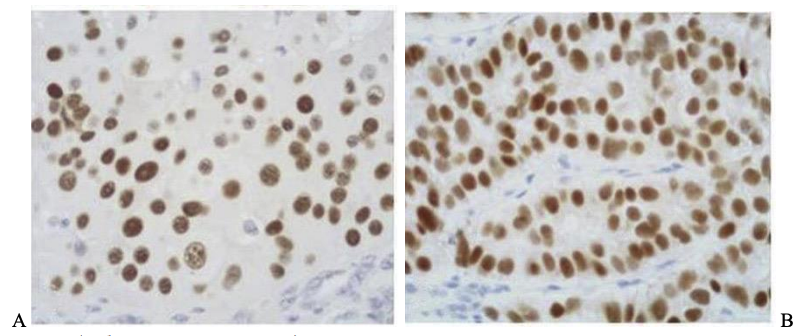
A- without the application of the IPH REG peptide.
B- with the application of the IPH REG peptide.
Figure 4. Expression of CXCL10. Hematoxylin and eosin staining X 400
Therefore, the IPH REG peptide possesses a high tissue regeneration capacity after mechanical injury, able to enhance cell proliferation, wound re-epithelialization, collagen deposition without any noticeable toxicity and inflammation.
The bcl-2 oncogene protein, which inhibits apoptosis, but its excess bcl-2 leads to cell accumulation, resulting in the development of malignant neoplasms. We studied the expression of this protein as one of the markers of the anti-tumor process. When the IPH REG peptide was applied, the expression of the bcl-2 protein decreased by 2.1 times compared to the results without the peptide application (Figure 5,6).
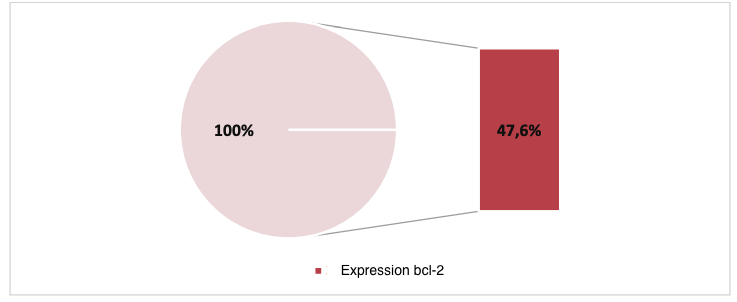
*p<0.05 compared to the control group.
Figure 5. Expression area of bcl-2 (%)
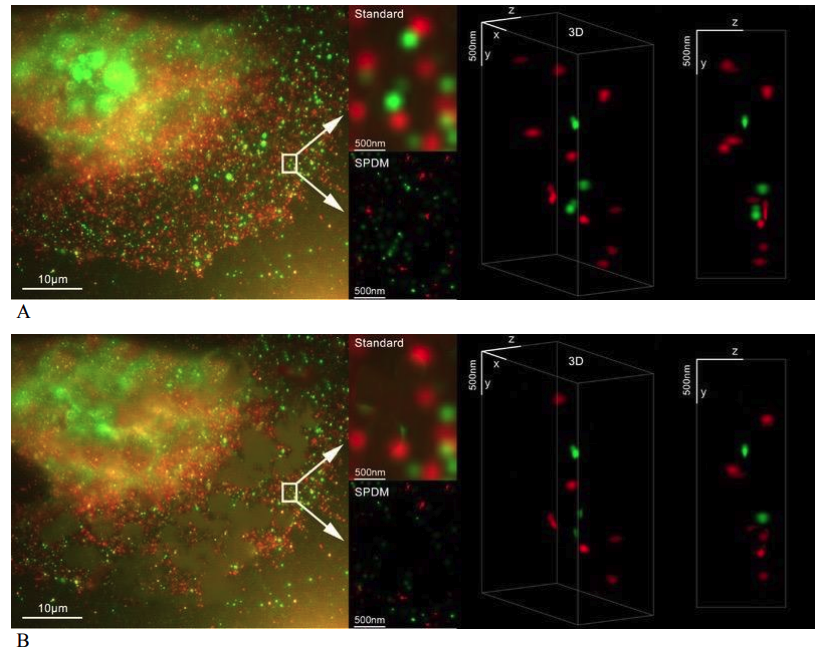
A- without the application of the IPH REG peptide.
B- with the application of the IPH REG peptide.
Figure 6. Expression of bcl-2. 3D microscopy format
Thus, the IPH REG peptide possesses wound-healing and anti-tumor properties in the development of mechanical injury on the experimental model in rats. The obtained data confirm the high ability of the IPH REG peptide to repair damaged DNA and regenerate cells.
We studied the antioxidant status of patients. The data are presented in Table 1. An increase in catalase, superoxide dismutase, xanthine oxidoreductase levels indicates the accumulation of free radicals, the development of oxidative stress, a reaction to adverse environmental stress.
Table 1: Parameters of antioxidant status (M±m)
|
Indicator
|
Before the Study
|
After 3 Months | After 6 Months | ||||
| Dosage of Peptide | Dosage of Peptide | ||||||
| 50 µg | 100 µg | 150 µg | 50 µg | 100 µg | 150 µg | ||
| Catalase, U/ml | 23,4±1,2 | 24,5±1,2 | 14,2±0,9,*,# | 13,9±0,9,* | 23.9±1.2, | 13,8±0,9,*,**, # | 14,1±0,9,*,** |
| Superoxide Dismutase, Units/g Hb | 2011,3±24,1 | 2009,4±23,9 | 1453,4±17,4*,# | 1542,9±18,1* | 1589,4±16,7 | 1489±21,1*,**, # | 1422,3±20,1*,** |
| Xanthine Oxidoreductase, U/ml | 6,33±0,13 | 6,19±0,13 | 4,89±0,14*,# | 4,67±0,15* | 6,22±0,17 | 4,78±0,11*,**, # | 4,76±0,11*,** |
*p<0.05 between parameters compared to the control group (before the study).
**p<0.05 between parameters after 6 months and 3 months.
***p<0.05 between parameters when applying 50 μg and 100 μg.